Reader! Reader!
Literary fiction, classics, dystopian, history, memoir, prize winners, and of course the 1001 books. You really might catch me reading anything!
Some odd little short stories
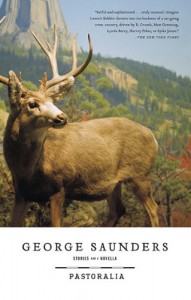
Published in 2000, this book was somehow completely off my radar. The six short stories in this volume all feature people who are generally unhappy. They are unhappy for different reasons, but every one of them is trying their best, and none are wallowing in their unhappiness.
Pastoralia, my favorite of the stories, features a man who is working as a caveman in a museum exhibit. Living at the museum full time, he is trying to make enough money for his young son's medical treatment.
Another story features a young man working as a stripper of sorts, trying to support his aunt, his two cousins, and each of their young children. With no education and no other options, his aunt makes a plan.
The other 4 stories also feature men--boy to middle aged--who are unhappy in their lives. None have given up. In many ways these stories reflect the common theme of unhappy people, but Saunders gives his characters agency that they act on.
With under 200 pages, this book is a quick read and highly recommended for fans of short stories and unusual story lines.
4 siblings, 4 very different lives
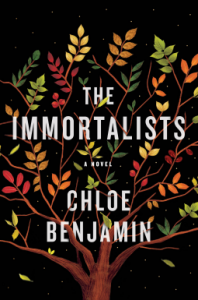
The novel begins in 1969 with Gold family--Saul, Gertie, and their 4 children Varya, Daniel, Klara, and Simon--living in New York City. One afternoon the 4 kids go to see a psychic who will tell them the dates of their deaths.
And from there we follow each of the kids' lives. How accurate was the pyschic? How does her prediction affect each of the kids in their life choices and career decisions? The 4 kids live very different lives in their daring, their career and educational choices--how much of that is a result of the predictions? Did the psychic (accidentally or otherwise) steer them to decisions that would lead to the intended outcomes? Or is fate just fate?
This book is very well written and well organized. I love family sagas and I love novels that follow people as this one does—and sometimes such novels get messy and confusing. Benjamin has done a great job telling the stories of the 4 kids while interweaving them and those of Saul and Gertie and significant others and their kids. She also ties up the potential loose ends of significant others and children.
A pleasure to read.
 2
2
The Warmth of Other Suns
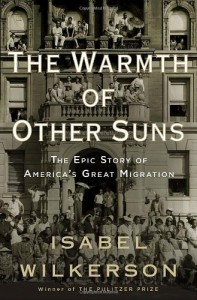
Amazingly researched and written history of the African-American/black migration from the south to the cities of the north, midwest, and west. Wilkerson is a Pulitzer-winning journalist, and journalists doing history usually drives me crazy. But she knows her stuff, can research, and can write--and her journalism background is undoubtedly useful for doing good oral history.
Wilkerson follows 3 black adults who left the south for somewhat different reasons (to escape to safety after his activism was well known, to achieve his dreams of being a top doctor, and to escape a life of sharecropping), in different decades, from different places, and for different destinations. The three did not know each other and came from fairly different backgrounds (educated but trapped in menial work, well educated, and sharecroppers)--but all lived under Jim Crow and had dreams for themselves and their children.
This book should be required reading for all Americans. It is moving, depressing, hopeful, and more--all at the same time. And it explains a lot of things Americans see every day--from segregated neighborhoods to crowded southern restaurants.
 1
1
Lazaretto

3.5 stars.
Even a quick summary will give away too much of the story, though it might not be obvious. Or maybe it would be.
Lots of characters (I love that) living in a Philadelphia post-Civil War African American neighborhood. But the story revolves around two white orphans, Linc and Bram, who are raised as brothers because they arrived at the orphanage as infants within days of each other. What are their back stories? Because they spend a lot of time with Meda, their wet nurse, and in the home of the Benins, her employers, they have more opportunities than many orphans--and the other kids know it. They also learn a lot about gambling and the African-American community from hanging out at Meda's brother Buddy's gambling hall.
As they grow up and run from the law, they end up in New York. Only Meda's death years later brings them back to Philly. And that is where the meat of the story begins—and the book is already half over.
After all the lead-up and several story lines that have nothing to do with the main story, there is a very abrupt ending. I want to know more! How does Buddy react? What happens with the quarantine? What happens with Bram? The doctor? Where does Linc go after the quarantine ends? What about Vergie? So. Many. Questions. So many loose ends.
The Bet

Chekhov is my favorite 19th century Russian author, but this short story is not his best work. It is definitely interesting and would be a great read for discussion—but it ends way too abruptly. What do those present when the bet was made think now that it's over? Or was this story written to be a discussion piece?
The Yellow Wall-Paper

It starts so simply...a couple is on vacation. She is ill and taking a rest in the country. But is that true? She is scared, and trapped, and not allowed to leave. Her fear is palpable. Or, maybe, she is an extremely unreliable narrator?
Bad Kitty Goes to the Vet

Both kids are longstanding Bad Kitty fans, and when the younger (also a teen now!) saw this at the bookstore, he asked me to get it from the library.
I want to say Bad Kitty has gone downhill, but maybe it's just that with the kids being teens and not reading this sort of thing anymore (me or them), I am just not used to it anymore, and they aren't really either. They both read it, I read it. Dad had to look at the one GREAT page, and we have a new family joke. "It's not THAT kind of thermometer Kitty!"
Yes we have cats.
Level Up

I good YA graphic novel about Dennis, a young man trying to find his way. Does he want to be a gastroenterologist, as his parents always hoped? Or does he want to be a professional gamer? Why do they want him to be a doctor so badly? And what does he really care about in life?
You can change your mind, as Dennis learns. And that might bring true satisfaction--it lets you know you HAVE chosen correctly for yourself.
The Past

Love the cover--if only the story were as strong.
As I read this novel, I felt such a sense of foreboding. Happy family, multiple generations, nosy neighbor, "the past", young lovers, missing dog, new wife, creepy cottage, old family home. What would go wrong? It felt creepy.
In the end, not so much. Nothing particularly unusual (well maybe a touch). Maybe I read the foreboding into it? Meh.
Actually, I think the cover introduces a bit of foreboding. Of the old, rundown, and overgrown cottage sort. Hmmm.
Saints

This is an excellent book, the drawings are great and I love how the Joan of Arc sequences are drawn in gold.
I also learned I know appallingly little about the Boxer Rebellion. I will be reading [book:Boxers|17210470] next, so perhaps I will learn a bit. I guess it it supposed to be first, but that's not how my 7th grader discovered them at the library, so there you go.
The House on the Borderland
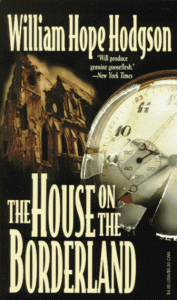
This book started off so promising--it was creepy in a science fictiony 1900 kind of way.
And then it got weird. Not science fiction weird. More like Carl Sagan narrating a tour of the universe as imagined by some guy in 1900. For chapters and chapters and chapters.
And then it goes back to part one, kind of. But now the terror is caused by something completely different.
All in just 186 pages.
WHY OH WHY is this book on the 1001 list?
 3
3
Sudden Death

"As I write, I don't know what this book is about", p. 203.
I don't really know either, but I don't feel bad about it after reading that.
I learned a lot about random things: real tennis, 16th century Popes and bishop and cardinals, Mexican featherwork, Caravaggio, Cortes. Thanks you google and wikipedia for being there for me as I read. Mostly I guess the book is about various people in the 16th century. Is the tennis game an allegory? I have no idea, I am not good with allegories. What does this book mean? I have no idea.
 2
2
The Tsar of Love and Techno

Wow.
I love books that feature connected short stories. That said, I wish I had kept notes of the characters' names from the beginning, because so many reappear much later in the book, and it took me a bit to wrap my head around who was who. Because not everyone knows everyone else. I feel like maybe I missed some tidbits that would add even more to the story--but nothing major. I can see how this could be a 5-star read for many. I wonder, if I had kept a character list, would it have been so for me?
At the same time, though, the use of the painting to connect the characters bugs me just a touch. It smacks of one of my favorite books, The Girl in Hyacinth Blue by Susan Vreeland, published in 1999. If you liked this one, I highly recommend that one. Yes it's different, but you'll see what I mean!
 1
1
The Burning Plain and Other Stories

The short stories in this collection--and some of them are very short, telling of just one incident--do an amazing job of evoking the landscape and climate of the region of Mexico described. It sounds like desert (more specifically, it sounds like the Colorado Desert in CA/AZ, which extends into Mexico). One of the stories, though, implies that the area is south of Mexico City. The landscape/climate is a character unto itself, and is so similar between the stories.
The main characters are poor, struggling, and doing what they need to do to get by. The stories do not specify if they are largely of Indian descent, though the intro says so. Perhaps Mexicans reading the original Spanish can tell, whether by names used, jobs held, or other clues that I miss as an American reading in English.
The Clancys of Queens
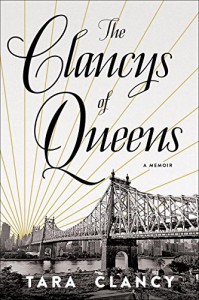
**I received an ARC of this book for an honest review.**
The Clancys of Queens is not the multigenerational memoir I was expecting. It is about Tara, her mom's family (the Riccabonos), her father, and the man who acted as her stepfather. Mostly, though, it is about Tara. Even Queens does not really appear as a character.
And Tara is young (under 40? under 35?), so this is a coming-of-age memoir. Yes, she grew up in 3 distinct places--her Italian grandparents' home with the old folks, her stepfather's Long Island estate, and her mom's Queens apartment. But she alternated, they were near each other, and she had a largely good and happy childhood surrounded by love. Which, honestly, makes for a bit of a dull memoir. Well written, but a touch dull--and not that unusual.
I imagine this will be most interesting to those familiar with Queens and Long Island, New York Italians (I am California Italian, and when she makes generalizations about Italian Americans, she really means New York Italians), and to LGBT young adults.
 1
1
American-Born Chinese

This National Book Award finalist YA graphic novel explores the ideas of the American Dream for immigrants and their children, who might not meet some of the parameters. Three seemingly separate stories—of Monkey from the ancient tale Monkey: The Journey to the West; of Jin, the son of immigrants; and of Chin Kee, every offensive stereotype rolled into one--all connect at the end.
I wonder how many of the people who pick up this book are even familiar with Monkey and his journey to the west (which I do really need to finish, though at this point I also need to start over). I wonder if I am missing something important in this story because I do not know his well enough.




